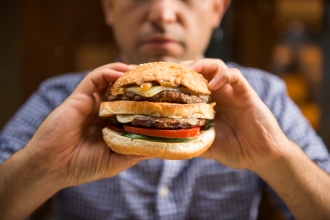5 Diets You Should Absolutely Avoid in 2020

By: Janice Rutkowski, M.D.
We’ve all seen the ads with the blaring headlines:
- LOSE 20 POUNDS IN 7 DAYS!
- BURN BELLY FAT NATURALLY!
- BLAST OFF 30+ LBS OF FAT IN 2 WEEKS!
There are dozens of diets on the market that promise super-fast weight loss, but many of them take an unbalanced approach to diet and nutrition. Some tell you to avoid “bad” foods, such as carbohydrates or fats, others restrict you to just a few foods, and still others require you to buy expensive supplements or pills.
Any diet that cuts out certain foods or limits calories can lead to short-term weight loss. But fad diets rarely bring long-term results because people often return to their previous eating habits when the diet ends. Also, people who follow extreme diets may not be getting all the nutrients they need to stay healthy.
Let’s look at five popular diets you should avoid in 2020. Then we’ll give you tips for managing your weight in a smart, healthy way.
- Carnivore diet: The carnivore diet has you eat mostly meat (along with some eggs and fat, like cheese). This is not a healthy or sustainable diet — it is extremely high in saturated fat, which can put you at risk for increased cholesterol levels, and it also leaves out a lot of foods that contain important nutrients, including fruits and vegetables.
- Whole30: This 30-day diet has you eat a lot of fresh, organic vegetables, grass-fed chicken and beef, and healthy fats like avocado and nuts. That’s well and good, but it also eliminates many foods, such as grains, dairy, soy, legumes, sugars and alcohol. And if you slip one day, you have to start over. The big problem with Whole30 is that it’s difficult to maintain. You may crave the foods you can’t eat and feel guilty if you “cheat.” This can turn into an unhealthy cycle where you avoid certain foods for a while and then binge on them later.
- Keto diet: “Keto” is a low-carbohydrate diet with plenty of meats, eggs, processed meats, sausages, cheeses, fish, nuts, butter, oils, seeds and fibrous vegetables. But you can’t eat breads, pasta, potatoes, rice, oats flour, sugar, fruit and alcoholic drinks. The diet’s low-carbohydrate content causes your blood sugar levels to drop, and your body begins breaking down fat to use as energy, a process caused ketosis. The problem is keto isn’t sustainable in the long term. Once your body enters ketosis, you also begin to lose muscle, become fatigued, and eventually enter starvation mode. This is particularly dangerous for people with kidney or liver conditions.
- Atkins diet: Atkins is the granddaddy of low-carb diets. It requires you to eat a lot of meat, cheese and eggs but severely limits carbohydrates, including sugar, bread, pasta, milk, fruits and vegetables. Similar to the keto diet, it causes your body to enter ketosis and burn fat. Like many fad diets, you lose weight quickly on Atkins, but it’s difficult to stay on it for long. Also, there is medical concern about the negative effects of a high-protein diet on kidney function, cholesterol levels, and the risks of heart disease, osteoporosis and cancer.
- Pegan diet: The pegan diet combines the popular paleo diet with some vegan principles. You eat lots of fruits and vegetables, along with nuts and seeds, oils, no dairy or gluten, a small amount of meat, and few beans or grains. You get to eat healthy foods, but the pegan diet restricts some foods that provides important nutrients. Also, since it limits what you can eat, it is hard to maintain over the long run.
Now that we’ve looked at diets to avoid, here are some good tips to help you achieve your weight-loss goal:
- Eat smaller portions: It’s common sense, if you want to lose weight, eat less. For example, if you usually eat a cup of rice, reduce it to a half cup. If you normally eat a plate full of pasta, cut down it to half a plate.
- Focus on healthier foods: Make fruits, vegetables, whole grains and lean meats, such as fish and chicken, the major part of your diet. Avoid junk foods, fast food and other foods you know are loaded with fats and calories. For helpful eating guidelines, see Choose My Plate from the USDA.
- Get physical: Exercise is the safest way to get fit and lose weight. And you don’t have to go to the gym seven days a week. Start with just five minutes a day and increase your activity gradually. Create an exercise plan that works for you with these guidelines from the Department of Health and Human Services. Strive for between 150 and 200 minutes a week.
- Avoid extra sugar: Sugar occurs naturally in many foods, and your body uses it for energy. But what you should do is avoid extra sugar. Skip dessert and stay away from drinks and snacks from are loaded with the sweet stuff. See these tips for reducing extra sugar from the American Heart Association.
- Don’t get hungry: You should never, ever skip meals. By being hungry, you increase the chances that you will binge on unhealthy snacks and food. Avoid hunger by always having some healthy snacks handy. Have a granola bar or eat a variety of nuts in between meals.
- Talk to your doctor: Before starting any weight-loss program, it’s a good idea to discuss it with your doctor to make sure it is balanced and healthy. Your doctor can make recommendations for eating plans, exercise programs and more.
 Dr. Rutkowski is a Maryland Primary Care Physicians, LLC partner and is certified by the American Board of Internal Medicine. She cares for patients at MPCP’s Arundel Mills office.
Dr. Rutkowski is a Maryland Primary Care Physicians, LLC partner and is certified by the American Board of Internal Medicine. She cares for patients at MPCP’s Arundel Mills office.





